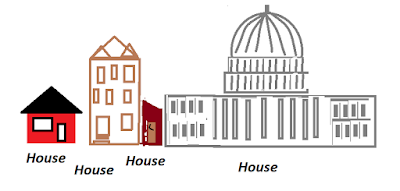"I saw a house" tells you something. But what if I told you I saw a mansion, a shack, a villa, a hovel, or a two-story clapboard Cape Cod?
Even if you have one word that will get the job done, it's always useful to have a wider vocabulary so that you can get the job done a little better (or understand someone else's writing or speech a little better).
Here are a few online resources to build and polish your vocabulary.
Merriam-Webster: free dictionary and thesaurus from a leading dictionary publisher. The site has lots more, including games and a featured Word of the Day (today's is "heterodox"). Subscribe to get the word of the day sent to your inbox. A blog post today discussed several words that were used during the impeachment hearings this week, such as "nefarious," "smear," and "kneecapping."
Wordnik: online dictionary with definitions from many sources. You can create lists and add comments to words (even words that aren't yet defined!). And you can subscribe to a word of the day
(today's is "ingesta," which appeals to me for some reason).
Vocabulary.com: an online dictionary with multiple-choice quizzes to help you learn words. I have the app on my phone and sometimes play the game for a few minutes here and there. If you sign up you can accrue points and win "badges" for different achievements. It's satisfying to have a perfect round! (See this post.)
Garner's Usage Tip of the Day & LawProse Lessons. You can use Garner's Modern English Usage as a reference (highly recommended), read it cover to cover, or leaf through it and read what grabs you. This email subscription gives you a quick lesson each day—considerably less daunting than reading the whole book. (Today's usage tip discussed "brake" and "break.")
Graphic: mw


No comments:
Post a Comment